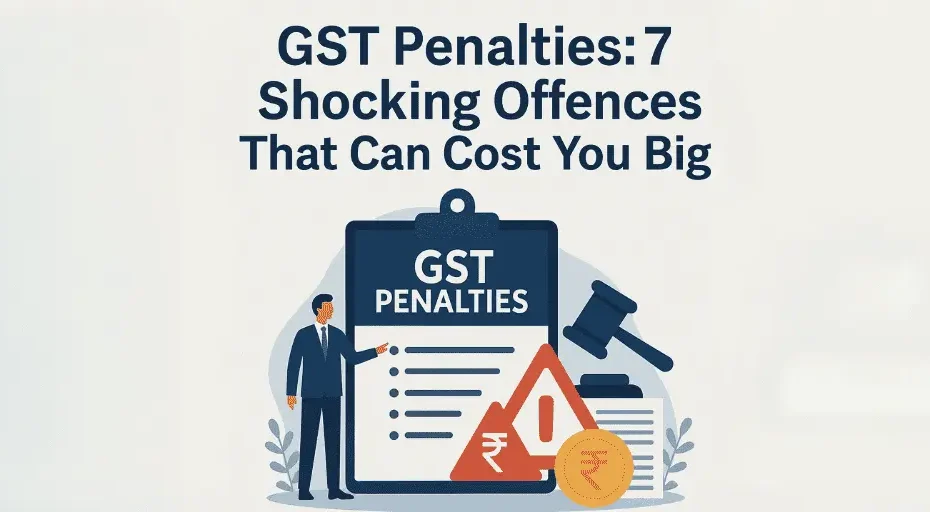GST Penalties and Offences: What You Need to Know
Goods and Services Tax (GST) has streamlined the Indian indirect tax system, bringing transparency and uniformity. However, with compliance comes the responsibility to follow the rules accurately. Non-compliance with GST regulations can lead to serious consequences in the form of GST penalties and legal actions. Whether you’re a business owner, accountant, or tax professional, understanding the nature of GST penalties is crucial to avoid unnecessary financial setbacks and legal hassles.
What Are GST Penalties?
GST penalties are financial or legal repercussions imposed on individuals or businesses that violate GST laws. These penalties may result from delays, misreporting, non-filing, or fraud. The GST law under the Central Goods and Services Tax Act (CGST Act), 2017, clearly lays down the framework for offences and associated penalties.
The primary objective of these GST penalties is to ensure timely compliance and discourage tax evasion. Depending on the severity of the offence, the law provides for monetary fines, interest charges, and even imprisonment.
Types of Offences Under GST
Offences under GST are classified based on intent and nature. Here are some of the common GST offences:
Failure to register under GST despite being liable
Issuing incorrect invoices or fake invoices
Collecting tax but not depositing it to the government
Availing or passing on input tax credit fraudulently
Obstructing a GST officer during their duty
Not maintaining proper records
Each of these offences can attract specific GST penalties based on whether the act was committed with intent (fraud) or without intent (negligence or oversight).
Monetary GST Penalties for Non-Compliance
Here’s a look at the monetary GST penalties imposed for various types of non-compliance:
1. Late Filing of Returns
If a business fails to file its GST returns on time, it attracts a late fee of:
₹50 per day (₹25 CGST + ₹25 SGST) for regular returns
₹20 per day (₹10 CGST + ₹10 SGST) for nil returns
Additionally, an interest of 18% per annum is levied on the outstanding tax amount.
2. Incorrect Invoice or Underreporting
Incorrectly reporting sales or issuing improper invoices may attract a penalty of ₹10,000 or the amount of tax evaded—whichever is higher.
3. Fraudulent Activities
If any offence is committed with fraudulent intent:
A penalty equal to the amount of tax evaded or ITC wrongly availed is levied
In some cases, prosecution and imprisonment may apply
These GST penalties serve as a strong deterrent against wilful evasion.
Penalties for Specific Offences
The CGST Act prescribes penalties for 21 specific offences. Some key examples include:
Section 122(1): For issues like not registering when liable, supplying goods without invoice, or availing input tax credit without receipt of goods/services.
Section 122(2): Covers penalties on transporters or warehouse owners who are involved in tax evasion.
Section 123: Penalty of ₹10,000 for failing to furnish information return.
Section 124: Penalty up to ₹25,000 for not furnishing statistics when asked.
These detailed provisions aim to address various types of GST penalties across industries and professions.
Prosecution and Arrest Under GST
Not all violations result only in monetary GST penalties. Some serious offences may lead to criminal charges such as prosecution and arrest. The following offences are punishable with imprisonment:
Tax evasion exceeding ₹5 crore – imprisonment up to 5 years
Obstruction or assault on a GST officer
Repeat offenders
These measures ensure strict compliance, especially in high-value transactions or organized fraud cases.
Compounding of Offences
The GST law allows compounding of certain offences, enabling the violator to pay a fee instead of facing prosecution. This is especially helpful for small businesses that commit offences unintentionally. However, compounding is not allowed for repeat offenders or in cases involving serious fraud.
How to Avoid GST Penalties
Avoiding GST penalties boils down to proper compliance and accurate recordkeeping. Here are a few tips:
Stay Updated: GST laws and rules often undergo amendments. Always stay informed.
File Returns Timely: Ensure timely filing of GSTR-1, GSTR-3B, and other applicable returns.
Reconcile ITC: Mismatch in input tax credit can lead to penalties. Reconcile your GSTR-2B and books regularly.
Use Reliable Accounting Software: Automated systems reduce human error.
Consult a Tax Professional: Regular audits and consultations can keep your business compliant and penalty-free.
Being proactive is the best way to safeguard your business from GST penalties.
Common Mistakes Leading to GST Penalties
Many businesses inadvertently make mistakes that lead to GST penalties, including:
Missing return deadlines
Claiming ITC on ineligible items
Filing incorrect details in returns
Not issuing proper tax invoices
Misclassifying goods or services
Understanding these common pitfalls can help businesses avoid penalties and maintain seamless compliance.
Conclusion
GST penalties are not just about monetary loss—they can damage a business’s credibility and disrupt operations. The GST framework provides clarity on offences and the corresponding penalties to maintain transparency and compliance across the country. Whether it’s late filing, tax evasion, or incorrect invoicing, every non-compliant action carries a cost.
The good news? With a diligent approach, modern accounting tools, and the right professional guidance, you can avoid most GST penalties and keep your business running smoothly. Always remember: compliance is not just a legal obligation but a business best practice.
Our GST Services

All E-commerce Tax services
E-commerce tax services help online sellers navigate GST registration, compliance, return filing, TCS management, tax planning, and audits, ensuring efficient tax management and legal compliance.

GST Filing
GST filing is the process of submitting tax returns to the government, detailing sales, purchases, and taxes paid or collected, ensuring compliance with GST laws.

GST Registration
GST registration is the process where businesses obtain a GSTIN from the government, allowing them to collect taxes, claim input tax credits, and comply with GST laws.



